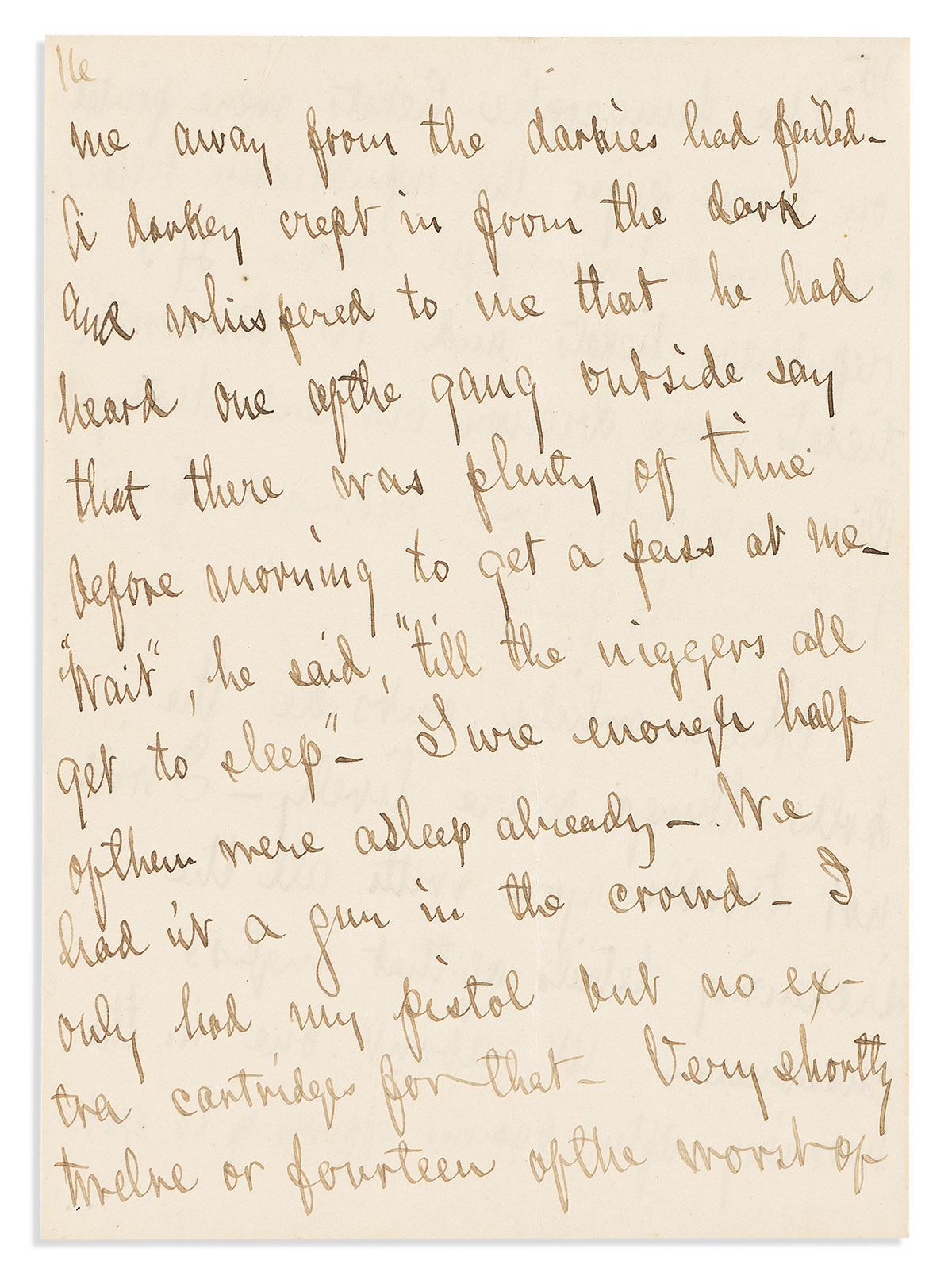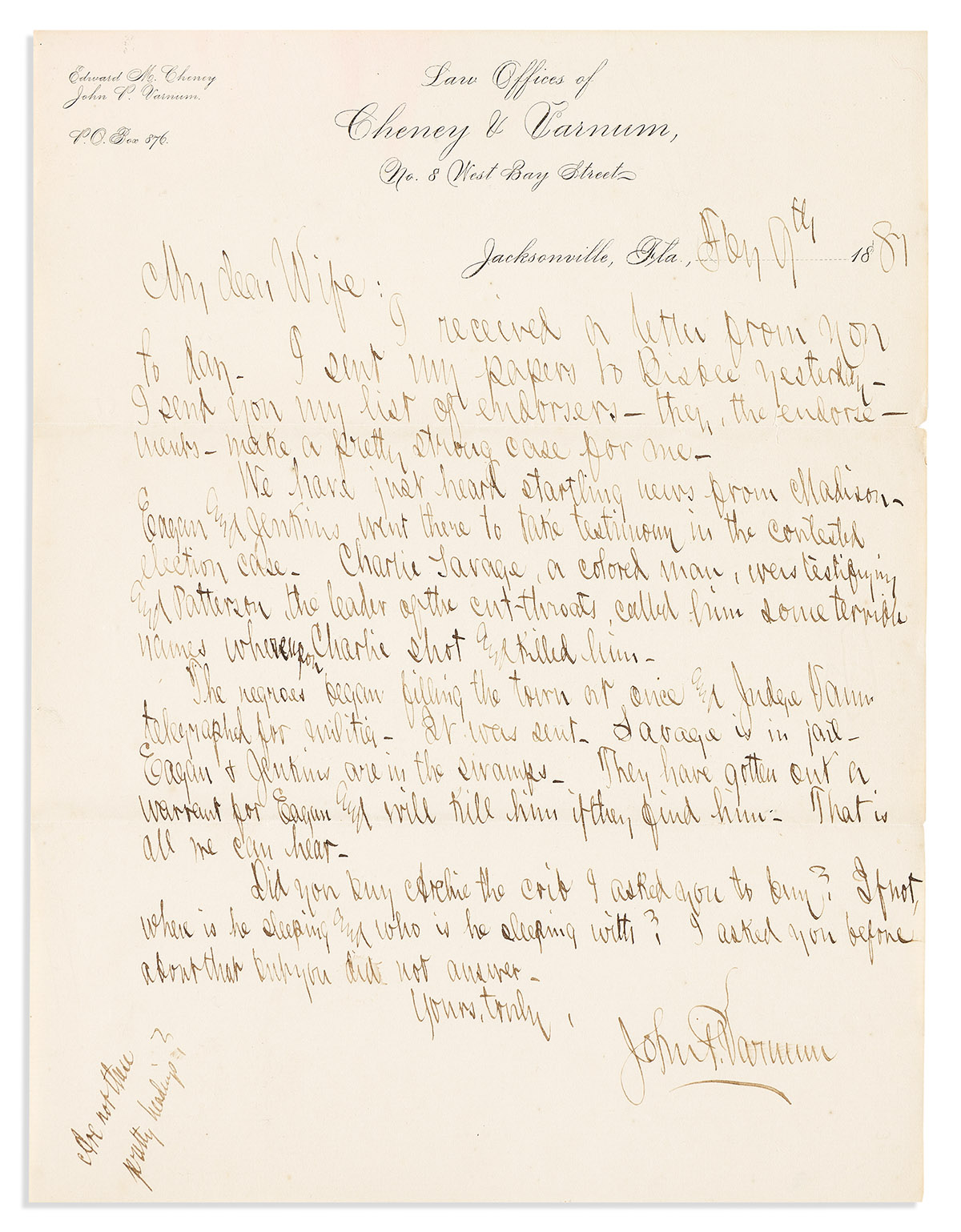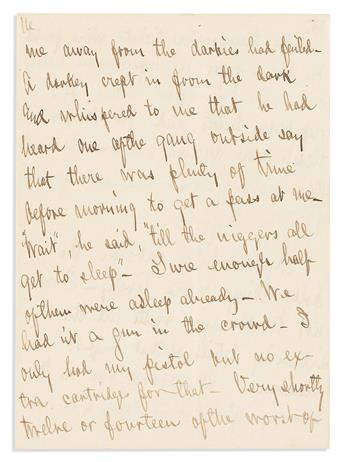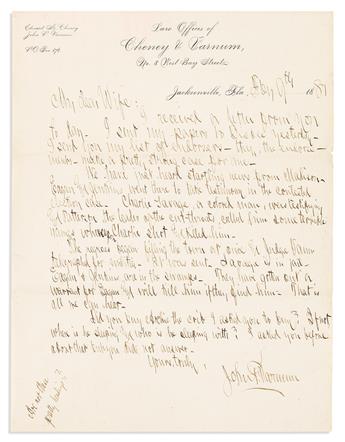Sale 2663 - Lot 373
Price Realized: $ 10,000
Price Realized: $ 12,500
?Final Price Realized includes Buyer’s Premium added to Hammer Price
Estimate: $ 10,000 - $ 15,000
(RECONSTRUCTION.) Correspondence of a Florida activist who risked his life for fair elections in the face of Klan violence. 17 items in one folder, most of them letters to John P. or Josephine Varnum; generally minor wear. Various places, 1873-1885 and undated (bulk 1880-1881)
Additional Details
"I saw a man dressed in a strange garb of white cloth. . ."
These letters are among the most vivid we have seen regarding the desperate efforts to preserve democracy in the South and keep alive the flickering promise of Reconstruction. John Prescott Varnum (1854-1888) was raised in Massachusetts, and headed south with his father Major John Varnum (1823-1911), who was appointed Adjutant General of Florida in 1870 during Reconstruction. The son was a journalist with the Florida Times-Union, a lawyer, treasurer for the state Republican Committee, and an advocate for fair elections.
The highlight of this collection is a jaw-dropping 31-page letter to his wife Josephine describing the 1880 election in the rural north-central Florida town of Greenville. Varnum placed his life in danger to ensure a fair vote, surviving several attempts on his life including a bullet wound to his shoulder, and escaping at night through a swamp. While the letter is worthy of publication in full, we can provide only a taste here: "Word had been sent by the Democrats that a marshal named Varney was coming and must be disposed of 'according to law.' . . . I saw in the gray light a crowd of men. I got off and walked to them. As I reached them, I saw they were Black. 'Hollo boys,' I said. 'I'm your man.' They gave me a little shout and surrounded me. 'We got him. Here he,' they shouted. I saw then several white men jump off the platforms of the cars and come toward us, but the darkies flocked about me and we walked rapidly down the road to a little church where we stayed till day. We had a sad day, no disturbance but threats and savage looks. We polled 389 votes: 262 Republican votes and 127 Democratic. . . . In the evening when the count began, I went to the window but we were surrounded by crackers who carried everywhere that day huge clasp knives open in their hands. The colored men took me forcibly away, back to my station on the hillside. They built two fires there, and surrounded by fifty colored men armed only with clubs, I prepared to sleep till morning. . . . The inspectors began counting tickets--no, not counting, but tallying votes without first counting the number of votes or tickets in the box. . . . After about one hundred votes were out a big loud-voiced Democrat came to the window and raised a row about it. He said it was all wrong, they must begin all over. They discussed it a while and then shoveled the ballots back in the box. Of course the clumsiest man in the world could have added handfuls to the heap. . . . There were 39 too many ballots in the box. They were dissatisfied and poured them out and counted them again. That time they increased it to fifty-three surplus. . . . A darkey crept in from the dark and whispered to me that he had heard one of the gang outside say that there was plenty of time before morning to get a pass at me. . . . We hadn't a gun in the crowd. I had only my pistol but no extra cartridge for that. Very shortly twelve or thirteen of the worst of the Democratic gang came over to our fire and sandwiched into our crowd. . . . 'Let's have a political meeting now and all belong to the same party and have a big hurrah.' I watched them closely, almost too long, for glancing over my shoulder to see what was taking place around me, I was startled at discovering creeping cat-like through the crowd at my left a man named Zack Hines, a big murderous-looking villain. . . . He had a huge white oak stick in his hand and when I saw him, he was in the very act of striking me. I covered him with my pistol. We glared at each other for a terrible half-minute and he backed away into the dark. . . . Five minutes later, a big fire was started, down near the depot. I saw they had brought in a wagon and I saw a man dressed in a strange garb of white cloth. . . . I needed no more to convince me I was to be hanged. . . . The darkies threw a load of wet moss on the fire, some colored man pulled my hat off and put his own black one on my head, and Ben and I walked out into the dark. I give you my word, I walked up that hill expecting to find it posted, expecting death. . . . Just then, right ahead, an owl hooted. Then away to the southwest another hooted. 'My God,' I said, 'they have posted the whole country. Can we cross the swamp, Ben, without going to the road?' . . . We piled into the swamp. A briar caught my eye and tore my face and eyelids badly. We were shortly up to our bodies in water." The next morning at dawn, "the train came, and Ben and I slipped down and entered the train. We had not been in the car five minutes before Maston O'Neil, one of the crowd who had tried to kill us the night before, came in and sat down opposite. He examined me closely and then just as the conductor shouted 'All aboard,' went out and jumped off on the piney woods side of the train. I immediately pulled down the blind. The train started. 'Bang!' . . . I started, felt a strange dull pain in my shoulder and turned to the window. The bottom of the sash was all torn to pieces. I threw myself on the floor of the car." The frightened train crew ignored calls from the mob to stop the train. Varnum was found to have a minor bullet wound, telling his wife "An inch higher and you would have been a widow, I suppose." Jacksonville, FL, 6 November 1880.
Another highlight is a 9 February 1881 letter to his wife describing a court hearing on the same elections: "We have just heard startling news from Madison. Eagan and Jenkins went there to take testimony in the contested election case. Charlie Savage, a colored man, was testifying and Patterson, the leader of the cut-throats, called him some terrible names, whereupon Charlie shot and killed him. The Negroes began filling the town at once, and Judge Vann telegraphed for militia. It was sent. Savage is in jail; Eagan & Jenkins are in the swamps."
In other letters, Varnum recommends Albion Tourgeé's classic Reconstruction novel "A Fool's Errand, by One of the Fools" and identifies the models for some of the characters (19 June 1880); and reflects at length on the death of President Garfield and describes the reaction in Jacksonville (20 September 1881). A partial draft of a speech in Varnum's hand was written to rally the Republican cause in Alachua County: "The Republican Party is pre-eminently a party of principles. . . . These principles made slavery hateful and abolished it; made universal suffrage desirable and accomplished it . . . took the heresy of secession by its ugly throat and strangled it."
The earliest item is an 1873 letter describing Florida politics, including gossip on the rampant bribery and drinking among the state's leadership. It is on the letterhead of John Varnum's Florida Adjutant General letterhead, addressed to a Mr. Dyer, although the signature is illegible. It notes the removal from office of Florida's first Black congressman Josiah Walls.
These letters are among the most vivid we have seen regarding the desperate efforts to preserve democracy in the South and keep alive the flickering promise of Reconstruction. John Prescott Varnum (1854-1888) was raised in Massachusetts, and headed south with his father Major John Varnum (1823-1911), who was appointed Adjutant General of Florida in 1870 during Reconstruction. The son was a journalist with the Florida Times-Union, a lawyer, treasurer for the state Republican Committee, and an advocate for fair elections.
The highlight of this collection is a jaw-dropping 31-page letter to his wife Josephine describing the 1880 election in the rural north-central Florida town of Greenville. Varnum placed his life in danger to ensure a fair vote, surviving several attempts on his life including a bullet wound to his shoulder, and escaping at night through a swamp. While the letter is worthy of publication in full, we can provide only a taste here: "Word had been sent by the Democrats that a marshal named Varney was coming and must be disposed of 'according to law.' . . . I saw in the gray light a crowd of men. I got off and walked to them. As I reached them, I saw they were Black. 'Hollo boys,' I said. 'I'm your man.' They gave me a little shout and surrounded me. 'We got him. Here he,' they shouted. I saw then several white men jump off the platforms of the cars and come toward us, but the darkies flocked about me and we walked rapidly down the road to a little church where we stayed till day. We had a sad day, no disturbance but threats and savage looks. We polled 389 votes: 262 Republican votes and 127 Democratic. . . . In the evening when the count began, I went to the window but we were surrounded by crackers who carried everywhere that day huge clasp knives open in their hands. The colored men took me forcibly away, back to my station on the hillside. They built two fires there, and surrounded by fifty colored men armed only with clubs, I prepared to sleep till morning. . . . The inspectors began counting tickets--no, not counting, but tallying votes without first counting the number of votes or tickets in the box. . . . After about one hundred votes were out a big loud-voiced Democrat came to the window and raised a row about it. He said it was all wrong, they must begin all over. They discussed it a while and then shoveled the ballots back in the box. Of course the clumsiest man in the world could have added handfuls to the heap. . . . There were 39 too many ballots in the box. They were dissatisfied and poured them out and counted them again. That time they increased it to fifty-three surplus. . . . A darkey crept in from the dark and whispered to me that he had heard one of the gang outside say that there was plenty of time before morning to get a pass at me. . . . We hadn't a gun in the crowd. I had only my pistol but no extra cartridge for that. Very shortly twelve or thirteen of the worst of the Democratic gang came over to our fire and sandwiched into our crowd. . . . 'Let's have a political meeting now and all belong to the same party and have a big hurrah.' I watched them closely, almost too long, for glancing over my shoulder to see what was taking place around me, I was startled at discovering creeping cat-like through the crowd at my left a man named Zack Hines, a big murderous-looking villain. . . . He had a huge white oak stick in his hand and when I saw him, he was in the very act of striking me. I covered him with my pistol. We glared at each other for a terrible half-minute and he backed away into the dark. . . . Five minutes later, a big fire was started, down near the depot. I saw they had brought in a wagon and I saw a man dressed in a strange garb of white cloth. . . . I needed no more to convince me I was to be hanged. . . . The darkies threw a load of wet moss on the fire, some colored man pulled my hat off and put his own black one on my head, and Ben and I walked out into the dark. I give you my word, I walked up that hill expecting to find it posted, expecting death. . . . Just then, right ahead, an owl hooted. Then away to the southwest another hooted. 'My God,' I said, 'they have posted the whole country. Can we cross the swamp, Ben, without going to the road?' . . . We piled into the swamp. A briar caught my eye and tore my face and eyelids badly. We were shortly up to our bodies in water." The next morning at dawn, "the train came, and Ben and I slipped down and entered the train. We had not been in the car five minutes before Maston O'Neil, one of the crowd who had tried to kill us the night before, came in and sat down opposite. He examined me closely and then just as the conductor shouted 'All aboard,' went out and jumped off on the piney woods side of the train. I immediately pulled down the blind. The train started. 'Bang!' . . . I started, felt a strange dull pain in my shoulder and turned to the window. The bottom of the sash was all torn to pieces. I threw myself on the floor of the car." The frightened train crew ignored calls from the mob to stop the train. Varnum was found to have a minor bullet wound, telling his wife "An inch higher and you would have been a widow, I suppose." Jacksonville, FL, 6 November 1880.
Another highlight is a 9 February 1881 letter to his wife describing a court hearing on the same elections: "We have just heard startling news from Madison. Eagan and Jenkins went there to take testimony in the contested election case. Charlie Savage, a colored man, was testifying and Patterson, the leader of the cut-throats, called him some terrible names, whereupon Charlie shot and killed him. The Negroes began filling the town at once, and Judge Vann telegraphed for militia. It was sent. Savage is in jail; Eagan & Jenkins are in the swamps."
In other letters, Varnum recommends Albion Tourgeé's classic Reconstruction novel "A Fool's Errand, by One of the Fools" and identifies the models for some of the characters (19 June 1880); and reflects at length on the death of President Garfield and describes the reaction in Jacksonville (20 September 1881). A partial draft of a speech in Varnum's hand was written to rally the Republican cause in Alachua County: "The Republican Party is pre-eminently a party of principles. . . . These principles made slavery hateful and abolished it; made universal suffrage desirable and accomplished it . . . took the heresy of secession by its ugly throat and strangled it."
The earliest item is an 1873 letter describing Florida politics, including gossip on the rampant bribery and drinking among the state's leadership. It is on the letterhead of John Varnum's Florida Adjutant General letterhead, addressed to a Mr. Dyer, although the signature is illegible. It notes the removal from office of Florida's first Black congressman Josiah Walls.
Exhibition Hours
Exhibition Hours
Aliquam vulputate ornare congue. Vestibulum maximus, libero in placerat faucibus, risus nisl molestie massa, ut maximus metus lectus vel lorem.






